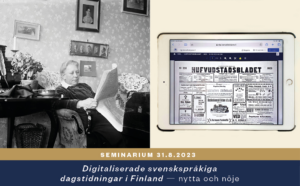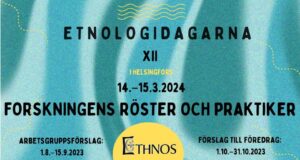
Tid:
Torsdag 31.8.2023
kl. 9.30–16.45
Varmt välkommen att delta i ett seminarium om digitaliserade svenskspråkiga dagstidningar i Finland, en värdefull resurs för forskare och andra historieintresserade.
Plats:
SLS hus, Riddaregatan 5,
Helsingfors / Online via Zoom
Seminariet ordnas som ett samarbete mellan Nationalbiblioteket och Svenska litteratursällskapet i Finland.
(Kutsu suomeksi alla.)
Tack vare ett samarbete mellan Finlands Nationalbibliotek och åtta finlandssvenska stiftelser digitaliseras samtliga svenska dagstidningar i Finland från 1940 framåt inom projektet Digitalisering och tillhandahållande av svenskspråkiga dagstidningar. Samtliga svenskspråkiga tidningar utgivna 1771–1949 har redan tillgängliggjorts för allmänheten på webbplatsen digi.kansalliskirjasto.fi.
Seminariets huvudspråk är svenska och engelska. Paneldiskussionen förs på svenska
och finska.
Anmälan senast 28.8.2023. Anmäl dig här.
Program
9.30 Kaffe
10.00 Kristina Linnovaara, arkivchef, Svenska litteratursällskapet i Finland, välkomstord
10.10 Ulrika Holgersson, docent i mediehistoria, Lunds universitet, Nycklar till en guldgruva – reflektioner och råd till pressforskaren
10.50 Jani Marjanen, docent, Avdelningen för kulturer, Helsingfors universitet, En autodidakt, höstack, dator och sluss: Digitaliserade tidningar och historisk forskning
11.30 Lunchpaus (på egen bekostnad)
12.50 Tiina Miettinen, FD, stipendieforskare, Tammerfors universitet, The world we have lost – And how to get it back. Newspapers as part of Family Research
13.30 Matias Kaihovirta, docent, Åbo Akademi, Digitaliserade svenskspråkiga dagstidningar – en omättlig resurs för historieforskning om finlandssvenskarnas historia
14.10 Kaffepaus
14.40 Ylva Perera, FM, litteraturredaktör, Hufvudstadsbladet, Vi skriver för nuet och historien – digitalisering och tillgänglighet ur ett dagstidningsperpektiv
15.20 Tuula Pääkkönen, systemspecialist, Nationalbiblioteket, All together now – Digitization and use of Swedish-language newspapers
15.40 Krister Lindén, forskningsdirektör, nationell koordinator för FIN-CLARIN, Avdelningen för digital humaniora, Helsingfors universitet, FIN-CLARIAH – en forskningsinfrastruktur för humaniora
16.00 Paneldiskussion på svenska och finska, Var, hur och när kan jag använda materialet? – Missä, milloin ja miten aineistoa saa käyttää?
Medverkande i panelen:
Pekka Heikkinen, juridisk expert, Nationalbiblioteket
Jonas Lång, kanslichef, Svenska litteratursällskapet i Finland
Jani Marjanen
Tiina Miettinen
Moderator Wivan Nygård-Fagerudd
Digitaliseringen av de svenskspråkiga tidningarna genomförs av Nationalbiblioteket med finansiering från Svenska litteratursällskapet i Finland, Svenska kulturfonden, Föreningen Konstsamfundet, Stiftelsen Tre Smeder, Stiftelsen Brita Maria Renlunds minne, Stiftelsen för Åbo Akademi, Svenska folkskolans vänner och Harry Schaumans Stiftelse.
Aika:
Torstai 31.8.2023
klo 9.30–16.45
Lämpimästi tervetuloa seminaariin, jonka aiheena ovat digitoidut, Suomessa julkaistut ruotsinkieliset sanomalehdet. Lehdet ovat todellinen aarreaitta tutkijoille ja kaikille historiasta kiinnostuneille.
Paikka:
SLS:n talo, Ritarikatu 5,
Helsinki / Etänä Zoomin kautta
Seminaarin järjestävät Kansalliskirjasto ja Svenska litteratursällskapet i Finland.
Kansalliskirjaston vuosina 2021–2023 toteutettavassa projektissa Ruotsinkielisten sanomalehtien digitointi ja käyttöön asettaminen digitoidaan kaikki suomessa vuodesta 1940 eteenpäin julkaistut ruotsinkieliset lehdet. Digitoinnin mahdollistaa kahdeksan suomenruotsalaisen säätiön tuki. Kaikki vuodesta 1771 vuoteen 1949 julkaistut ruotsinkieliset lehdet on jo saatettu suuren yleisön käyttöön digi.kansalliskirjasto.fi -verkkopalvelussa.
Seminaarin pääkielet ovat ruotsi ja englanti. Paneelikeskustelu käydään ruotsiksi ja suomeksi.
Ilmoittautuminen viimeistään 28.8.2023. Voit ilmoittautua tästä.
Ohjelma
9.30 Kahvi
10.00 Kristina Linnovaara, arkistonjohtaja, Svenska litteratursällskapet i Finland, tervetuliaissanat
10.10 Ulrika Holgersson, mediahistorian dosentti, Lundin yliopisto, Nycklar till en guldgruva – reflektioner och råd till pressforskaren
10.50 Jani Marjanen, dosentti, Kulttuurien osasto, Helsinki, En autodidakt, höstack, dator och sluss: Digitaliserade tidningar och historisk forskning
11.30 Lounas (omakustanteinen)
12.50 Tiina Miettinen, FT, apurahatutkija, Tampereen yliopisto, The world we have lost – And how to get it back. Newspapers as part of Family Research
13.30 Matias Kaihovirta, dosentti, Åbo Akademi, Digitaliserade svenskspråkiga dagstidningar – en omättlig resurs för historieforskning om finlandssvenskarnas historia
14.10 Kahvitauko
14.40 Ylva Perera, FM, kirjallisuustoimittaja Hufvudstadsbladetissa, Vi skriver för nuet och historien – digitalisering och tillgänglighet ur ett dagstidningsperpektiv
15.20 Tuula Pääkkönen, tietojärjestelmäasiantuntija, Kansalliskirjasto, All together now – Digitization and use of Swedish-language newspapers
15.40 Krister Lindén, tutkimusjohtaja, FIN-CLARIN:in kansallinen koordinaattori, Digitaalisten ihmistieteiden osasto, Helsingin yliopisto, FIN-CLARIAH – en forskningsinfrastruktur för humaniora
16.00 Paneelikeskustelu ruotsiksi ja suomeksi, Var, hur och när kan jag använda materialet? – Missä, milloin ja miten aineistoa saa käyttää?
Paneelin osallistujat:
Pekka Heikkinen, lakimies, Kansalliskirjasto
Jonas Lång, kansliapäällikkö, Svenska litteratursällskapet i Finland
Jani Marjanen
Tiina Miettinen
Keskustelua johtaa Wivan Nygård-Fagerudd
Ruotsinkieliset lehdet digitoidaan Kansalliskirjastossa seuraavien säätiöiden tuella: Svenska litteratursällskapet i Finland, Svenska kulturfonden, Föreningen Konstsamfundet, Stiftelsen Tre Smeder, Stiftelsen Brita Maria Renlunds minne, Åbo Akademin säätiö, Svenska folkskolans vänner ja Harry Schaumans Stiftelse.

